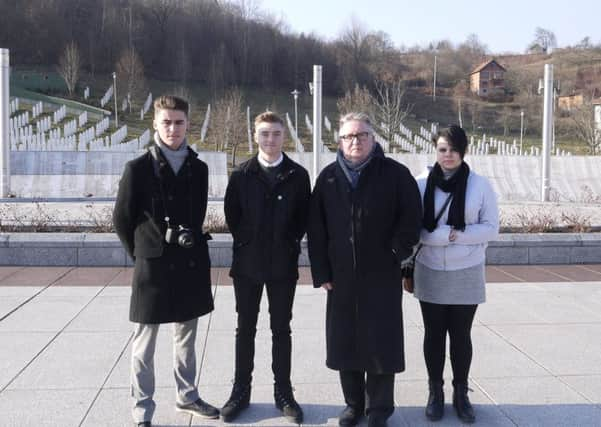Milton Keynes students sisit Bosnia on Future Leaders Programme


Sir Leon Herbert Academy in Bletchley was one of four schools selected to be part of the programme. They had previously worked closely with the charity Remembering Srebrenica to teach their students about the need to tackle hatred through commemorating the genocide and doing workshops to learn the lessons from it.
The visit is part of a year-long programme that aims to educate young people about the Srebrenica genocide - the worst atrocity on European soil since the Second World War, and the consequences of hatred.
Advertisement
Advertisement
The students attended workshops before and after the visit, as well as the four-day visit to Bosnia in order to equip them with the knowledge and confidence to share what they have learned with their schools and wider communities.
The group learned about the genocide in Srebrenica which happened 22 years ago, when Ratko Mladić and his Bosnian Serb forces marched into the town of Srebrenica and systematically murdered 8372 Bosnian Muslim men and boys. They heard from survivors of the genocide and relatives of the victims.
“Visiting Bosnia and hearing from survivors of the genocide is a moving but vital experience and it is clear to see the impact these visits have on young people. We have taken nearly a thousand people on the Lessons from Srebrenica programme over the last three years and all have returned to become Community Champions, promoting safer, stronger and more cohesive communities in the UK,” said Remembering Srebrenica education manager, Rebecca Heron.
“We are looking to build long-term relationships with these young people and work with them, not just throughout the year, but also to follow their progress after they leave school, either through university or into forthcoming careers, to support them in their role as future leaders against hatred and intolerance.”
Advertisement
Advertisement
Sir Leon Herbert Academy’s Paul Salver travelled on the delegation and reflected on what he’d learnt: “It is so important for young people to see this for themselves, to walk in the path of recent war and genocide. This is absolutely something that they need to learn and spread to other people. It is the power of speaking with, and meeting survivors which gives this project its real impact.”
Student Dru Blackman was one of three pupils from the school accepted onto the programme: “It is vital that we educate people about why hatred is so destructive and why tolerance is so important; without tolerance and understanding things like this can happen. We have seen the most destructive part of humanity”
The Future Leaders in Schools programme is one aspect of Remembering Srebrenica’s wider education programme which has seen more than 32,000 children benefit from its work in schools, and in excess of 2,000 participate in the 8-3-7-2 memorial football tournament.
Remembering Srebrenica works to honour and remember the victims and survivors of the genocide and learn lessons from this horrific crime to show where hatred and discrimination can lead. It organises the UK Srebrenica Memorial Day on the EU-wide day of remembrance for the victims of the genocide on 11 July.